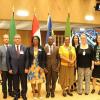News
Displaying Results 26 - 50 of 165
Originally introduced in policy and development discussions in 2011, the water-food-energy-ecosystem nexus approach has evolved into a pivotal framework for sustainable development and achieving the Sustainable Development Goals (SDGs).
Work on the water-energy-food-ecosystems nexus under the…
Infrastructure is crucial for social and economic development. To achieve the 2030 Agenda for Sustainable Development, infrastructure needs to be green, climate resilient, circular, inclusive and fiscally sustainable, with people as the main beneficiaries. Infrastructure is also needed to rebuild…
Trade facilitation is a potent instrument that can multiply the benefits of trade. Beyond direct impact on economic growth through higher trade flows linked to improved efficiency at the borders, trade facilitation reforms can also contribute to other policy goals. For example, through the…
Cooperation and management of transboundary waters, which span over 45% of the world's surface and serve as vital resources for nearly half of the global population, face the imminent threat of underfunding. The last reporting exercise on Sustainable Development Goals (SDG) indicator 6.5.2 (2020),…
According to a recently published UNECE Policy Paper, the agrifood, the garment and footwear and the mineral sectors contribute significantly to the economic growth and employment in the UNECE region, while being major sources of global greenhouse gases (GHG) and environmental pollution. Evidence…
Transparency in the environmental performance of economic activities and effective public access to environmental information, especially on products, are indispensable in addressing pressing environmental challenges. This also supports a just transition towards a green and circular economy,…
In the UNECE region, the Fourth Cycle of Environmental Performance Reviews (EPR) kicks off with the review of Tajikistan, carried out for the fourth time under the leadership of UNECE.
A large, multidisciplinary team of international experts worked in Dushanbe from 6 to 15 November 2023,…
The European Commission has proposed a new legislation, the European Critical Raw Materials Act, to ensure a secure and sustainable supply of critical raw materials for the EU. The Act, on which the European Parliament and the European Council reached a provisional agreement on 13 November,…
Strong private sector engagement positively impacts the relevance, legitimacy, and credibility of national trade facilitation bodies (NTFBs) and encourages a business-centric approach to trade facilitation. Over the past several years, governments, donors and international organizations have…
In the pan-European region, citizens are feeling the impacts of climate change through extreme weather events. This undermines equitable access to water and sanitation as human rights, due to increasing water scarcity and increased burden of water diseases due to overflow of untreated sewerage…
Transboundary rivers, lakes, and aquifers play a vital role in supporting the livelihoods of billions of people worldwide. Roughly 60% of global freshwater flow is in shared basins. About 40% of the world’s population lives in shared basins. The development and management of transboundary water…
Central Asia has significant untapped potential to decarbonize its energy systems and accelerate the sustainable energy transition, including through renewable energy development and enhanced resource management. To help the region capitalize on these opportunities, UNECE, the United Nations…
Almost all of Botswana’s territory sits within transboundary rivers basins. Although landlocked, Botswana is therefore a ‘water-linked’ country. The Cubango-Okavango, Limpopo, Orange-Senqu and Zambezi Rivers all provide crucial freshwater arteries that supply people and nature, including the…
UNECE support for the revision of the Georgian Mining Code Act is shaping the future of resource classification and estimation standards in Georgia. During a workshop in Tbilisi participants discussed how Georgian standards could play a crucial role in harmonizing with the global dimensions of the…
Clothing production has doubled in the past 15 years. In 2018, the fashion industry produced around 2.1 billion tons of greenhouse gas emissions (GHG) – 4% of the world’s total – leading to major environmental, health and social challenges. In 2020 in Europe, textile consumption had the third…
Turkmenistan has made significant progress in increasing the share of the non-state sector in its GDP (excluding fuel and energy), which reached 71.1% in 2022. Public-Private Partnerships (PPPs) are considered by Turkmenistan as an important tool to further advance the implementation of the SDGs…
An estimated 3.6 billion people face inadequate access to water at least a month per year – a figure expected to increase to more than 5 billion by 2050. According to WMO, over 50% of global catchment areas and reservoirs displayed deviations from normal conditions in 2022, of which the majority…
Sustainable and climate finance needs in Central Asia are considerable, with an estimated 38 billion US dollars per year up to 2030. On the other hand, the total foreign direct investment flows in the region in 2022 amounted to 10 billion US dollars. The infrastructure finance gap is therefore huge…
The ongoing repercussions of the COVID-19 pandemic, geopolitical instability, and elevated inflation rates continue to pose challenges to global trade, with the World Trade Organization (WTO)'s trade growth forecast now estimated at only 0.8% this year.
As the global trade landscape grapples…
Since 2009 when Public-Private Partnerships (PPPs) were introduced in Kyrgyzstan, 66 projects have been implemented in the country, providing access to critical public services to more than 1 million citizens. These PPP projects are the driving forces of the economic and social development in…
In the Drina River Basin, shared mainly by Bosnia and Herzegovina, Montenegro and Serbia, working together across borders and jointly addressing water and energy challenges is a key part of effective climate action and the green transition.
As part of the Sarajevo Energy and Climate Week (25-29…
Taking up some of the main results of the recent review report, which assessed the effectiveness of the amended Protocol to Abate Acidification, Eutrophication and Ground-Level Ozone (Gothenburg Protocol) under the UNECE Convention on Long-range Transboundary Air Pollution, experts discussed…
Bringing together countries to share progress and experience on how to effectively manage their shared waters is a key characteristic of the Water Convention. Cooperation for the management of transboundary waters to promote sustainability, peace and security is the Convention’s mantra - especially…
Since September 2022, as part of “The Sustainability Pledge” initiative, UNECE has been working with fashion company Stella McCartney and its Cotton supplier SÖKTAS to trace a T-shirt made of jersey fabric through documentary evidence.
The UNECE blockchain platform allows to capture all actors…
Central Asian countries are actively working towards improving access to water and sanitation. Despite recent progress, Kazakhstan's aging infrastructure, lack of human resources and financial constraints still limit the access of rural population to improved water and sanitation services. In 2022…

























